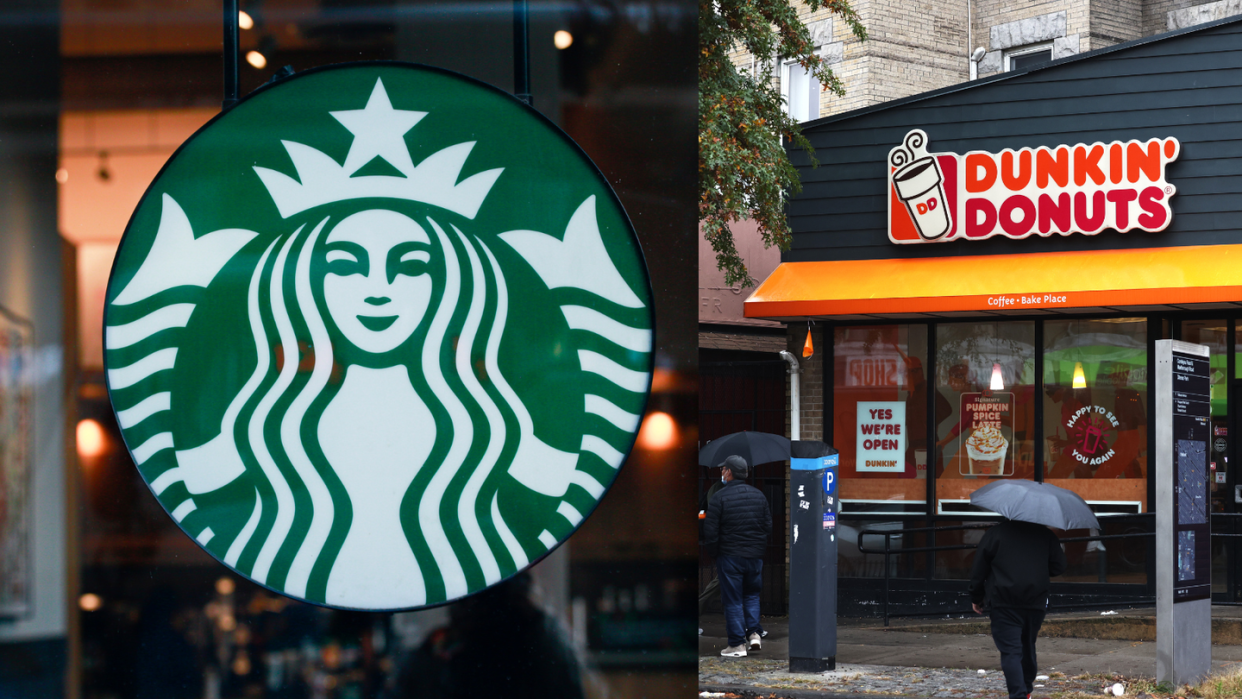Should Charging More For Non-Dairy Milk Be Illegal? Two Class-Action Lawsuits Say It Should Be

"Hearst Magazines and Yahoo may earn commission or revenue on some items through these links."
Dairy milk still has the majority of the market share, but the rise in popularity of plant-based alternatives is impossible to ignore. Almond and oat milk have grown from coffee shop afterthoughts to menu mainstays. Some third-wave chains like Blue Bottle and Stumptown even use oat milk as the default on their menu.
At most coffee shops, however, consumers still need to pay a surcharge for plant-based alternatives. The added fee has long drawn the ire of animal rights and vegan activists. Back in 2020, PETA helped organize a series of nationwide Starbucks protests over the “vegan tax.”
Two recent class-action lawsuits filed in California allege that this practice is discriminatory. The first suit, filed in December 2023, brought the complaint against Dunkin’ and seeks no less than $5 million.
The second lawsuit came in March of this year and seeks the same amount of money in damages from Starbucks. Both cases argue that since lactose intolerance and milk allergies could be recognized as a disability under the Americans with Disabilities Act, imposing a dairy-free surcharge constitutes discrimination.
The U.S. Justice Department confirms that some individuals with food allergies may have a disability if it substantially limits life activities, which could include eating and "the functions of the gastrointestinal system.”

Under the ADA, businesses that are open to the public are required to "make reasonable modifications to policies, practices and procedures where needed.” Both lawsuits assert that providing non-dairy options at no extra cost is considered a necessary accommodation.
Food allergies were first extended protections under the ADA in 2012, when the Justice Department settled with Lesley University to ensure access to allergen-free foods in the school’s mandatory dining plan. The department notes that these accommodations aren’t applicable to all places that serve food.
"Because [Lesley University’s] meal plan was mandatory for all students living on campus, the ADA required that the University make reasonable modifications to the plan to accommodate students with celiac disease and other food allergies,” they write. "This is different than the ADA's obligation for restaurants that serve the general public."
Attorney Keith Gibson represents plaintiffs involved in both of the suits. In 2022, Gibson filed a case in Florida against Starbucks on the same grounds. The plaintiffs of that case voluntarily dismissed the case last month, according to The Guardian. When asked by LA Times reporters about the case, Gibson declined to reveal whether a settlement had been reached.
Another claim made by the two California class-action suits argues that the price of dairy and non-dairy milks are comparable. "There is no material difference between the price of lactose-containing milks and the price of non-dairy alternatives that would support levying the surcharge to substitute for a non-dairy alternative," the Dunkin’ lawsuit says.
Researchers at Purdue University say otherwise. An analysis published last year found that the average cost of oat milk is more than double that of dairy milk. Almond and soy are more cost effective alternatives, but still cost around 20 percent more on average.
Dunkin' moved to dismiss the class-action suit against them last month, and a hearing has been set for April 19 in San Francisco. Starbucks representatives have declined to comment on their pending litigation t. They do, however, stress that U.S. customers can add up to four ounces of non-dairy milk to hot and ice brewed coffee or tea, cold brew, and americanos free of charge.
You Might Also Like
